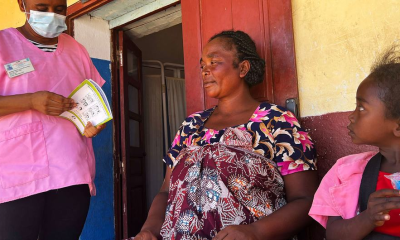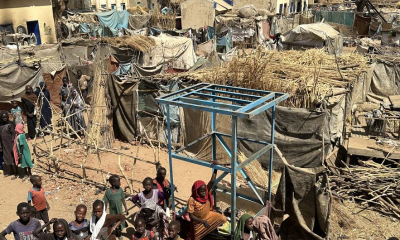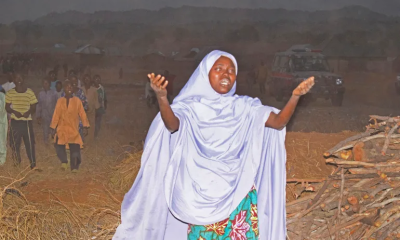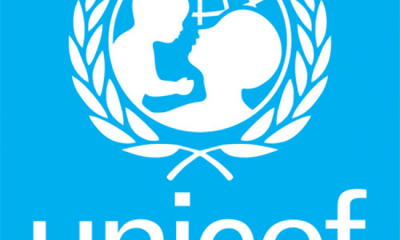News
Building communities that are resilient to disaster risks and climate change effects
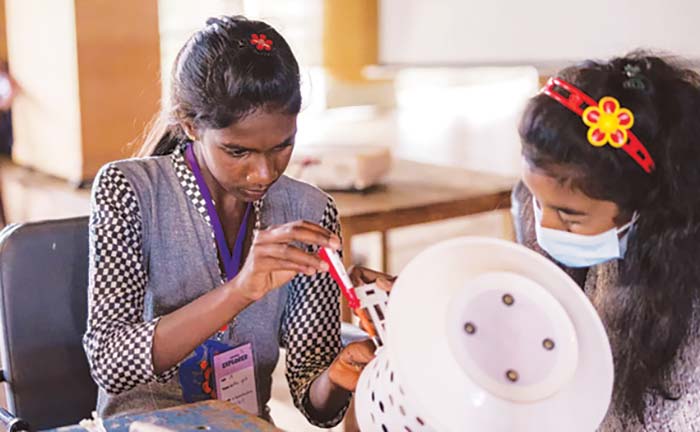
(UNICEF) Climate change impacts the lives and livelihoods of everybody worldwide, including here in Sri Lanka. As a climate change hotspot, the island nation experiences frequent, extreme weather conditions including floods, landslides, and droughts, causing considerable economic setbacks.
The country’s main export crop, tea, bears the brunt of these weather conditions. Spread across over 200,000 hectares in the mountainous regions of Sri Lanka’s Central, Uva, and Sabaragamuwa Provinces and the in-lands of the Southern Province, the tea plantations are exposed to the harsh and extreme weather pattern changes caused by climate change, affecting the productivity and quality of the tea harvest.
The one million plus population that lives on these estates and depends on the tea sector for sustenance, is not spared either. Identified as one of the most vulnerable populations in the country, the estate communities particularly face climate-induced risks such as sudden and extreme changes in weather patterns. The consequences of these include damage to their meagre estate dwellings due to landslides, disruption of children’s schooling, and the daily tea plucking.
To build resilience amongst the plantation community to climate-induced risks, in June 2023, UNICEF engaged with 130 children living in the tea estates to teach them about climate change, the changing weather patterns and how they can minimize their risks. UNICEF partnered with Kelani Valley Plantations Ltd. (KVLP) – a leading tea and rubber manufacturer in Sri Lanka that owns and manages 25 estates spread across 13,000 hectares, and Gavesha Labs (Pvt) Ltd – an organization that develops supplementary educational tools for science, technology, engineering, and mathematics (STEM) learning, for this initiative.
KVLP facilitated the participation of children living in Pedro Estate, Nuwara Eliya, through the child development centres (CDCs) of the eight estate divisions, and Gavesha brought in the technical capacity and the learning design through the WeatherKids STEM education programme to teach children about the climate and how they can use technology to protect it.
During workshops spread across three months, the Gavesha team empowered the children to take their first big step towards learning about the weather and climate change and explore a whole new world of technology and nature. For the learning exercise, 8 children’s clubs were formed under the CDCs they represented, and a mentor was assigned to each club.
Children worked in teams to learn to build a weather station, how to operate it to measure and track weather-related information, and how to use a mobile device to share information via a public open-source platform. They also learned about climate change, how it impacts their lives on the estates, and how tracking weather information can help them stay safe from severe weather.
Careers in climate change and communicating about the weather were also part of the programme. Additionally, the programme used achievement badges and prizes to recognize and encourage their participation to gain a holistic, practical insight into a whole new world of weather and climate change.
By the end of the first workshop, each children’s club was a proud owner of a weather station. These Do-It-Yourself stations built by the children included the typical Stevenson Frame enclosing the sensors for temperature and humidity, air pressure, solar radiation monitoring; a manual rain gauge, and a solar panel to keep the station running.
“We built a weather station and learned how to use it to take readings. As a girl, I am happy I was able to take part in this,” says Banusha (15) who was part of an all-girls team from Lovers Leap Division, Pedro Estate. “We take readings regularly and provide our community with useful information about the weather.” Banusha also earned the achievement badge ‘Innovator’ for her participation in the programme.
“The WeatherKids programme is designed to engage children with nature and to teach them about climate change and the importance of monitoring weather patterns,” explains Ushan Chaminda, Lead Explorer of Gavesha Labs. “What we aim to provide is a unique learning experience a journey that allows kids to experience and understand climate challenges at a personal level.”
The Weatherkids programme is a first step towards empowering plantation communities with key skills to take action in what impacts their lives, livelihoods and future. Understanding the weather pattern changes in their surroundings and being part of a national community that monitors weather and contributes accurate weather data, the children gained a sense of ownership over their surroundings. Additionally, the learning was designed to provide these youth with the knowledge to think beyond the limitations of their plantation community.
This innovative approach towards building climate-informed business communities that are resilient to climate-induced risks steps up private sector collaboration and sharing of responsibility in response to climate change and disaster.
“This is the first time a programme such as this has been initiated in the plantation sector. All our activities in the tea estates are centred around weather: rainfall, wind, and temperature which all play important roles in this business. This programme is therefore useful for the stakeholders,” explains Dilum Pathirana, General Manager, Pedro Estate.
Latest News
The upcoming election is an opportunity to ensure that the allocations of public funds reach rural communities -PM

Prime Minister Dr. Harini Amarasuriya stated that while the opposition views the upcoming election as just another attempt to gain power, for the government, it is an opportunity to ensure that the allocations of public funds to reach rural communities without corruption.
The Prime Minister made these remarks on Monday (April 21) afternoon while addressing a public gathering held in the Maligawatte division of the Colombo Central electorate.
Speaking at the public gathering, Prime Minister Dr. Harini Amarasuriya further noted:
“Our government has already commenced it’s work. We presented our first budget, which covers the next eight months. Our goal is to bring some relief and development to the people who have suffered for years, and to develop the rural economy.
Those who are seeking to criticize the current government do not initiate in addressing the extensive financial mismanagement of previous governments.
We are managing public finances with the utmost prudence and are committed to undertaking development projects in the best interest of the people. To ensure these initiatives are successfully implemented at the grassroots level, we require clean and capable local leadership.
Therefore, this election is extremely decisive. This election has been delayed for so long. Our foremost task is to resume and complete development projects that were abandoned by previous administrations, and to rectify the errors they have left behind.
The current government considers and conscious about every rupee it spends. If there are thieves at the local level when sending allocated public funds to villages, how can we develop them? Let us treat the people’s decision to steer the country in the right direction as the third major challenge, and on May 6, achieve a victory similar to past elections.
Two separate political cultures cannot exist, one at the top and another at the grassroots. If we are to operate at the highest levels without waste, corruption, or fraud, the same standard must be upheld locally. Only the National People’s Power (NPP) has presented candidates who reflect this integrity.
The nominee of NPP for the position of Mayor of Colombo is not an individual elevated by political lineage, but someone who has walked the streets of Colombo, understands its people, and is deeply aware of their issues. Ms. Vraie Cally Balthazaar, who during her office as my private secretary, has consistently demonstrated the capacity to respond sensitively and competently to complex matters that makes her best suited for the mayoral position.
An individual who favours a single platform, segment, or locality cannot represent Colombo as a whole. We need someone who can serve all of Colombo with empathy and dedication. The NPP has put forward its candidates with the sole purpose of serving the people and working in their best interest.
The annual revenue of the Colombo Municipal Council is Rs. 30 billion. Had this sum truly been utilised for the benefit of the public, the city would not be in its current state. Despite this revenue, Colombo has schools such as Ananda, Nalanda, and Royal and also the schools that lack even the adequate teaching staff, access to clean water, and basic sanitation facilities. How did we reach this point?
Greater responsibility for addressing local issues lies with provincial councils and local government institutions. If these institutions cannot fulfil their mandates, how can we hope to build a new nation?
Under the guidance of present administration, the national economy has begun to recover. Tourist arrivals are increasing, and the country is embarking on a path of development. Yet, there remains much to be done. In order to transform national development plans into practical results at the community level, strong and principled leadership within local and municipal councils is essential.
Prime Minister Dr. Harini Amarasuriya urged the public to exercise their vote with careful consideration in order to liberate the nation from corrupt politics and to resolve longstanding challenges.
The event was attended by Deputy Minister of National Integration Mohamed Muneer, Colombo mayoral candidate Ms. Vraie Cally Balthazaar, local council candidates, and party members.
[Prime Minister’s Media Division]
News
Food security committee convenes for the sixth time

The Food Security Committee convened for the sixth time on Monday (21), at the Presidential Secretariat, headed by Minister of Agriculture, Livestock, Lands and Irrigation K.D. Lalkantha and Minister of Trade, Commerce, Food Security and Cooperative Development Wasantha Samarasinghe.
The meeting was convened to discuss and make policy decisions focused on enhancing food security in the country.
Secretary to the Prime Minister Pradeep Saputhanthri, Senior Additional Secretary to the President Kapila Janaka Bandara and other members of the Food Policy and Security Committee, comprising Ministry Secretaries, were also present at the meeting.
Latest News
Heat index is likely to increase up to ‘Caution level’ at some places in Northern, North-central, North-western, Western, Southern and Eastern provinces and in Ratnapura, Monaragala districts

Warm Weather Advisory
Issued by the Natural Hazards Early Warning Centre of the Department of Meteorology for 22 April 2025
The public are warned that the Heat index, the temperature felt on human body is likely to increase up to ‘Caution level’ at some places in Northern, North-central, North-western, Western, Southern and Eastern provinces and in Ratnapura, Monaragala districts.
The Heat Index Forecast is calculated by using relative humidity and maximum temperature and this is the condition that is felt on your body. This is not the forecast of maximum temperature. It is generated by the Department of Meteorology for the next day period and prepared by using global numerical weather prediction model data.
Effect of the heat index on human body is mentioned in the table below and it is prepared on the advice of the Ministry of Health and Indigenous Medical Services.

ACTION REQUIRED
Job sites: Stay hydrated and takes breaks in the shade as often as possible.
Indoors: Check up on the elderly and the sick.
Vehicles: Never leave children unattended.
Outdoors: Limit strenuous outdoor activities, find shade and stay hydrated. Dress: Wear lightweight and white or light-colored clothing.
Note:
In addition, please refer to advisories issued by the Disaster Preparedness & Response Division, Ministry of Health in this regard as well. For further clarifications please contact 011-7446491.
-

 Business3 days ago
Business3 days agoDIMO pioneers major fleet expansion with Tata SIGNA Prime Movers for ILM
-

 News2 days ago
News2 days agoFamily discovers rare species thought to be extinct for over a century in home garden
-

 Features5 days ago
Features5 days agoNipping the two leaves and the bud
-

 Features4 days ago
Features4 days agoProf. Lal Tennekoon: An illustrious but utterly unpretentious and much -loved academic
-

 Features5 days ago
Features5 days agoAvurudu celebrations … galore
-

 Foreign News3 days ago
Foreign News3 days agoChina races robots against humans in Beijing half marathon
-

 News5 days ago
News5 days agoCounsel for Pilleyan alleges govt. bid to force confession
-

 Editorial3 days ago
Editorial3 days agoSelective use of PTA







